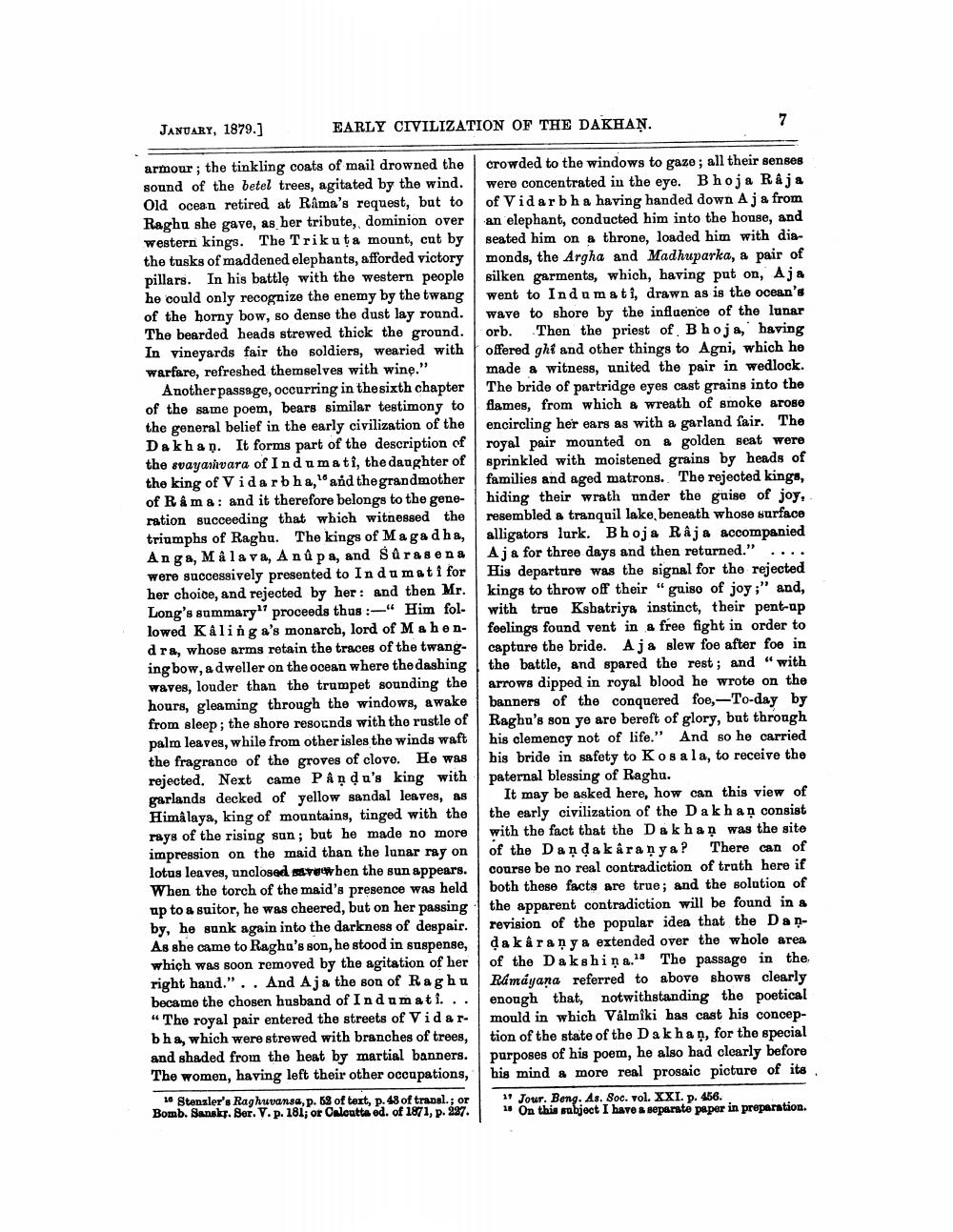________________
JANUARY, 1879.]
EARLY CIVILIZATION OF THE DAKHAN.
armour; the tinkling coats of mail drowned the sound of the betel trees, agitated by the wind. Old ocean retired at Rama's request, but to Raghu she gave, as her tribute, dominion over western kings. The Trik uta mount, cut by the tusks of maddened elephants, afforded victory pillars. In his battlo with the western people he could only recognize the enemy by the twang of the horny bow, so dense the dust lay round. The bearded heads strewed thick the ground. In vineyards fair the soldiers, wearied with warfare, refreshed themselves with wine."
Another passage, occurring in the sixth chapter of the same poem, bears similar testimony to the general belief in the early civilization of the Dakhan. It forms part of the description of the svayanivara of Indumati, the daughter of the king of Vidarbha, and the grandmother of Råm&: and it therefore belongs to the generation succeeding that which witnessed the triumphs of Raghu. The kings of Magadha, Anga, Málava, A n û pa, and Sarase na were successively presented to Indumati for her choice, and rejected by her: and then Mr. Long's summary" proceeds thus :-“ Him fol- lowed Kåling a's monarch, lord of Mahen- dra, whose arms retain the traces of the twanging bow, a dweller on the ocean where the dashing waves, louder than the trumpet sounding the hours, gleaming through the windows, awake from sleep; the shore resounds with the rustle of palm leaves, while from other isles the winds waft the fragrance of the groves of clove. He was rejected. Next came PÅndu's king with garlands decked of yellow sandal leaves, as Himalaya, king of mountains, tinged with the rays of the rising sun; but he made no more impression on the maid than the lunar ray on lotus leaves, unclosed savewhen the sun appears. When the torch of the maid's presence was held ap to a suitor, he was cheered, but on her passing by, he sunk again into the darkness of despair. As she came to Ragha's son, he stood in suspense, which was soon removed by the agitation of her right hand." .. And Aja the son of Raghu became the chosen husband of Indumati... “The royal pair entered the streets of Vidar. bha, which were strewed with branches of trees, and shaded from the heat by martial banners. The women, having left their other occupations,
10 Stensler's Raghuvansa, p. 58 of text, p. 48 of transl.; or Bomb. Sanska. Ser. V. p. 181; or Calcutta ed. of 1871, p. 127.
crowded to the windows to gaze; all their senses were concentrated in the eye. Bhoja Raja of Vidarbha having handed down Aja from an elephant, conducted him into the house, and seated him on a throne, loaded him with diamonds, the Argha and Madhuparka, a pair of silken garments, which, having put on, Aja went to Indumati, drawn as is the ocean's wave to shore by the influence of the lunar orb. Then the priest of Bhoja,' having offered ghi and other things to Agni, which he made a witness, united the pair in wedlock. The bride of partridge eyes cast grains into the flames, from which & wreath of smoke arose encircling her ears as with a garland fair. The royal pair mounted on a golden seat were sprinkled with moistened grains by heads of families and aged matrons. The rejected kings, hiding their wrath under the guise of joy, resembled a tranquil lake beneath whose surface alligators lurk. Bhoja RÂj & accompanied Aja for three days and then returned." .... His departure was the signal for the rejected kings to throw off their "guiso of joy;" and, with true Kshatriya instinct, their pent-ap feelings found vent in a free fight in order to capture the bride. Aja slew foe after foe in the battle, and spared the rest; and "with arrows dipped in royal blood he wrote on the banners of the conquered foe,-To-day by Raghu's son ye are bereft of glory, but throngh his clemency not of life." And so he carried his bride in safety to Kosala, to receive the paternal blessing of Raghu.
It may be asked here, how can this view of the early civilization of the Dakhan consist with the fact that the Dakhan was the site of the Dandakâranya? There can of course be no real contradiction of truth here if both these facts are true; and the solution of the apparent contradiction will be found in a revision of the popular idea that the Danda kâranya extended over the whole area of the Dakshina. The passage in the Rámáyana referred to above shows clearly enough that notwithstanding the poetical mould in which Válmiki has cast his conception of the state of the Dakhaṇ, for the special purposes of his poem, he also had clearly before his mind a more real prosaic picture of its W Jour. Beng. As. Soc. vol. XXI. p. 456.
On this subject I have a separate paper in preparation.




